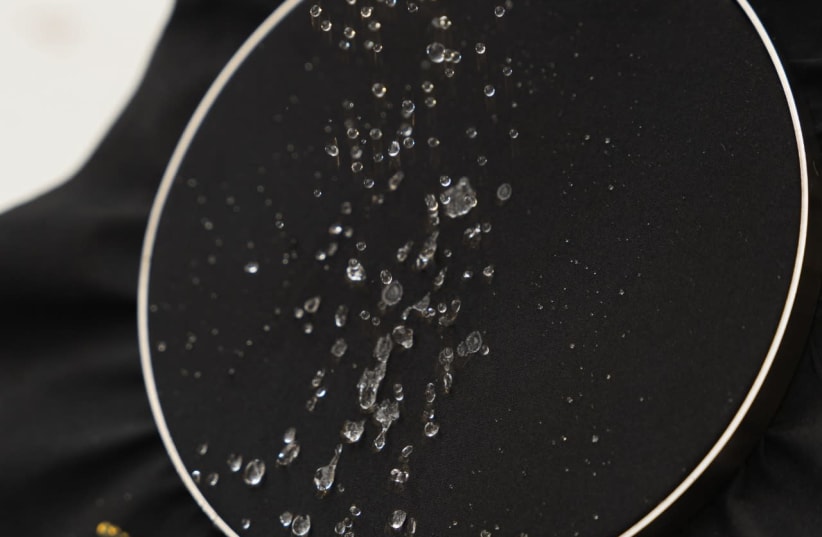Sonovia, an innovative Israeli company developing sustainable textile surface-enhancement technology, announced on Monday that a recent experiment found their patented ultrasound technology was able to bring fabrics to the highest level of water resistance according to international standards.
Sonovia was able to reach this level of water resistance with a "significantly lower concentration level of active ingredients that currently used water-resistance methods," without the need for toxic chemical pollutants such as PFOS and PFOA.
The tests were performed at the Qima International Laboratory according to the International Standard for the Testing of Water Immunity - AATCC-22, in accordance with the guidelines and requirements of Sonovia's commercial partner, and their results indicated a level 100 water resistance, the highest possible level, for each fabric sample tested.
The tech still needs to undergo more performance testing in an external lab and is expected to end this phase of product testing towards the end of this month.
The market for chemical compounds for imparting global waterproof properties is estimated to size at around $800 million per year.
Today, however, the chemical compounds used for imparting waterproof properties that exhibit the highest efficiency for water resistance, as well as the highest resistance to household washes are based on the chemical compounds PFOA (Perfluorooctanoic acid) and PFOS (perfluorooctane sulphonate).
Both of these compounds are currently being rigorously examined by various regulatory authorities around the world due to them being suspected of being carcinogenic, causing mutations in DNA, impairing fertility, and functioning as long-lasting pollutants in nature and in the human body.
According to Sonovia, companies operating in this market anticipate that the use of these materials could be restricted or banned in the coming years and as a result, there is a need to find solutions to impart water-resistant qualities to fabrics without the use of these materials, while maintaining similar performance.Apart from its recent success in water resistant technologies, Sonovia has been on the forefront of developing a mask that kills coronavirus on contact.The SonoMask, as it's called, displayed an ability to neutralize the novel coronavirus at an effectiveness of 99.34% within trials performed by the ATCCR Testing laboratory in China, Ramat Gan-based Israeli fabric maker and developer Sonovia announced last year.Sonovia’s reusable anti-viral masks are coated in zinc oxide nanoparticles that destroy bacteria, fungi and viruses, which it says can help stop the spread of the coronavirus.Results from the most recent round of testing showed that the mask has the ability to neutralize fallen traces of SARS-COV-2 within 30 minutes after making contact with the fabric. The SonoMask was also proven to maintain its protective properties throughout 55 wash cycles.Sonovia also participated in trials with Adler Plastic in Italy earlier this year, working toward creating a solution for carpets and other types of fabrics. The company boasted a 99.999% efficiency rate against bacteria during the pilot testing round.Sonovia is an important Alumnus and Scaling program percipient of Fashion for Good, which is the world's leading accelerator program for start-up companies in the textile industry that present novel innovations with significant sustainability merits. Fashion for Good is owned by the European fashion retailer giant C&A. The program's partners include Gucci, Chanel and Adidas.Zachary Keyser and Reuters contributed to this report.
